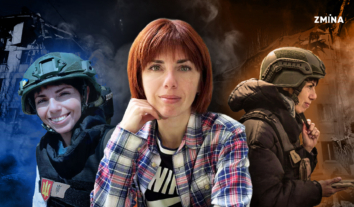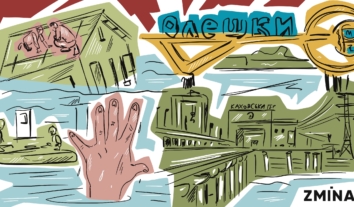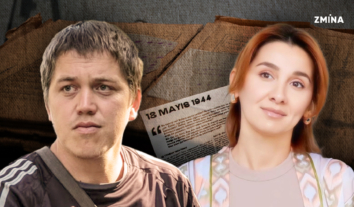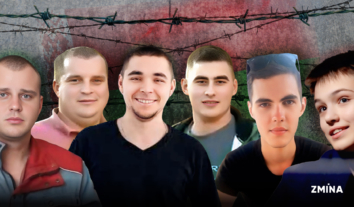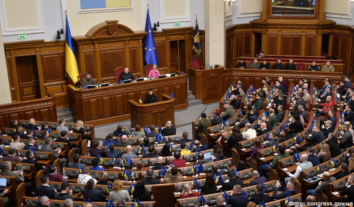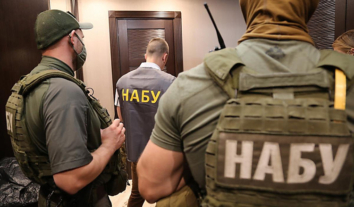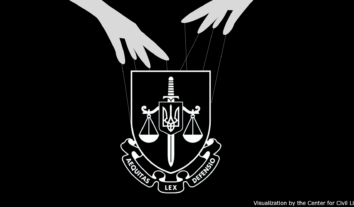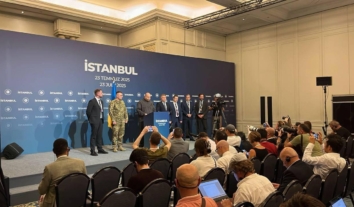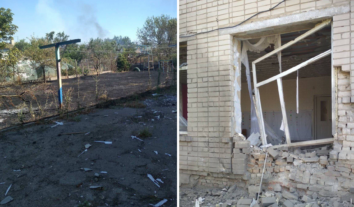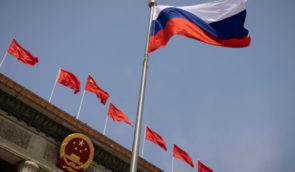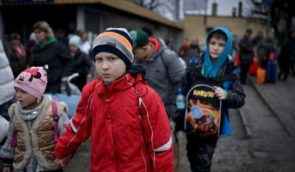Fines and imprisonments: How Crimeans are persecuted for the truth about the war in Ukraine and dissatisfaction with the occupation
Crimean human rights defenders have highlighted a surge in persecutions of Crimeans for “publicly discrediting Russian army actions”. The vast majority of court cases have signs of politically motivated persecution for expressing opinions.
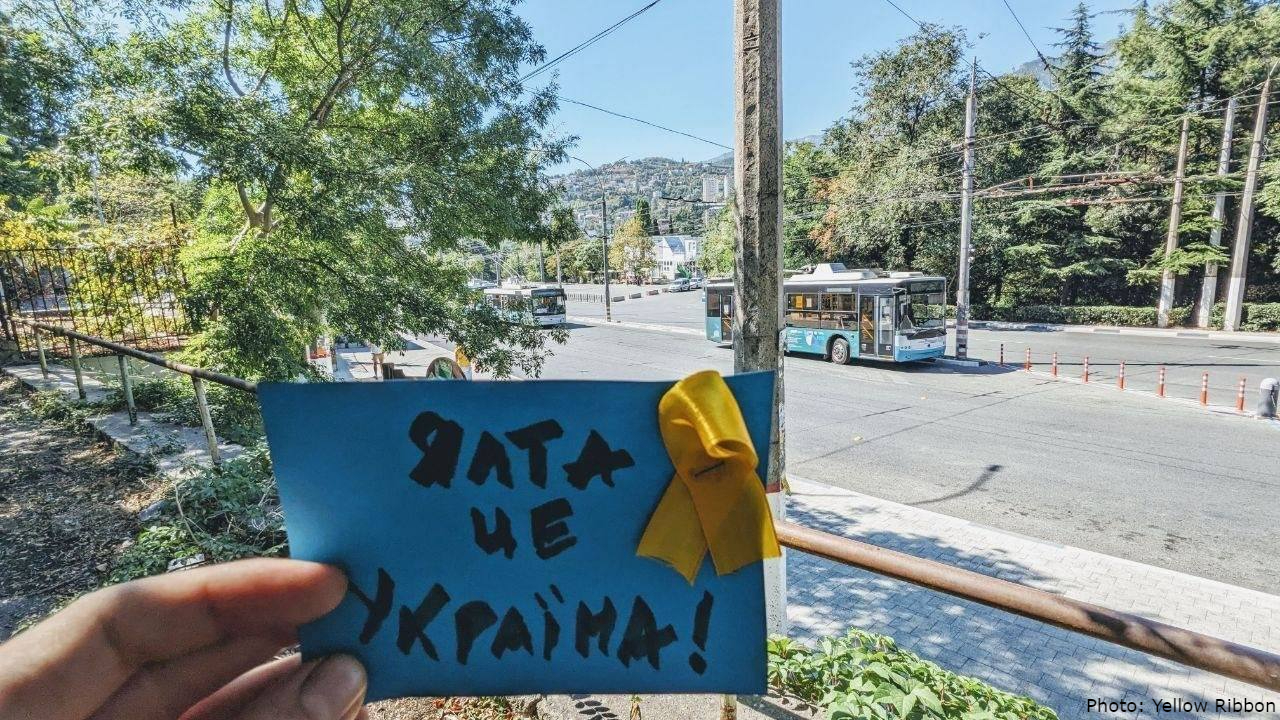 Inscription “Yalta is Ukraine”
Inscription “Yalta is Ukraine”According to the the NGOs Crimean Process and Crimean Human Rights Group, the full-scale invasion into Ukraine sparked protests in the temporarily occupied Crimea.
One of the tools widely used by Russia to suppress anti-war and pro-Ukrainian sentiment, article 20.3.3 of the Code of Administrative Offenses, penalises “public actions aimed at discrediting the use of the military forces of the Russian Federation for the protection of Russian interests and its citizens, support for international peace and security”.
Since March 4, 2022, a new law in Russia has allowed the government to punish people for publicly criticising the Russian military or supporting Ukraine. Crimean Process has been tracking how this law is used in the “courts” of occupied Crimea. Human rights defenders of the NGO have been analysing the data regarding violations of access to fair justice standards, as required by the Geneva Convention relative to the Protection of Civilian Persons in Time of War and Article 6 of the European Convention on Human Rights and Fundamental Freedoms.
Russia is using the new law to prosecute people for a wide range of anti-war and pro-Ukrainian activities, including:
- Posting pro-Ukrainian content on social media;
- Speaking out against the war in interviews or singing Ukrainian songs;
- Holding protests or non-verbal demonstrations of support for Ukraine;
- Writing pro-Ukrainian graffiti or vandalizing symbols used by the Russian military in the war.
Escalating suppression of anti-war sentiments
As of September 19, 2023, at least 472 people in Crimea have been charged with violating the new law against criticizing the Russian military or supporting Ukraine. Of those, 424 have been convicted.
The Mission of the President of Ukraine in the Autonomous Republic of Crimea documented 514 cases of administrative offenses under Article 20.3.3 of the Code of Administrative Offenses, that were presented to the illegal “courts” in Crimea as of September 22, 2023. Previously, the Mission had published a report detailing Russia’s persecution of Crimeans for expressing anti-war sentiments following the onset of Russia’s full-scale military aggression against Ukraine.
The “courts” returned police protocols in order to remove the violations in 25 cases. Trials were terminated in 10 cases due to various circumstances, including 4 cases during the last quarter. Additionally, hearings were postponed to dates beyond the research’s timeframe in 12 cases.
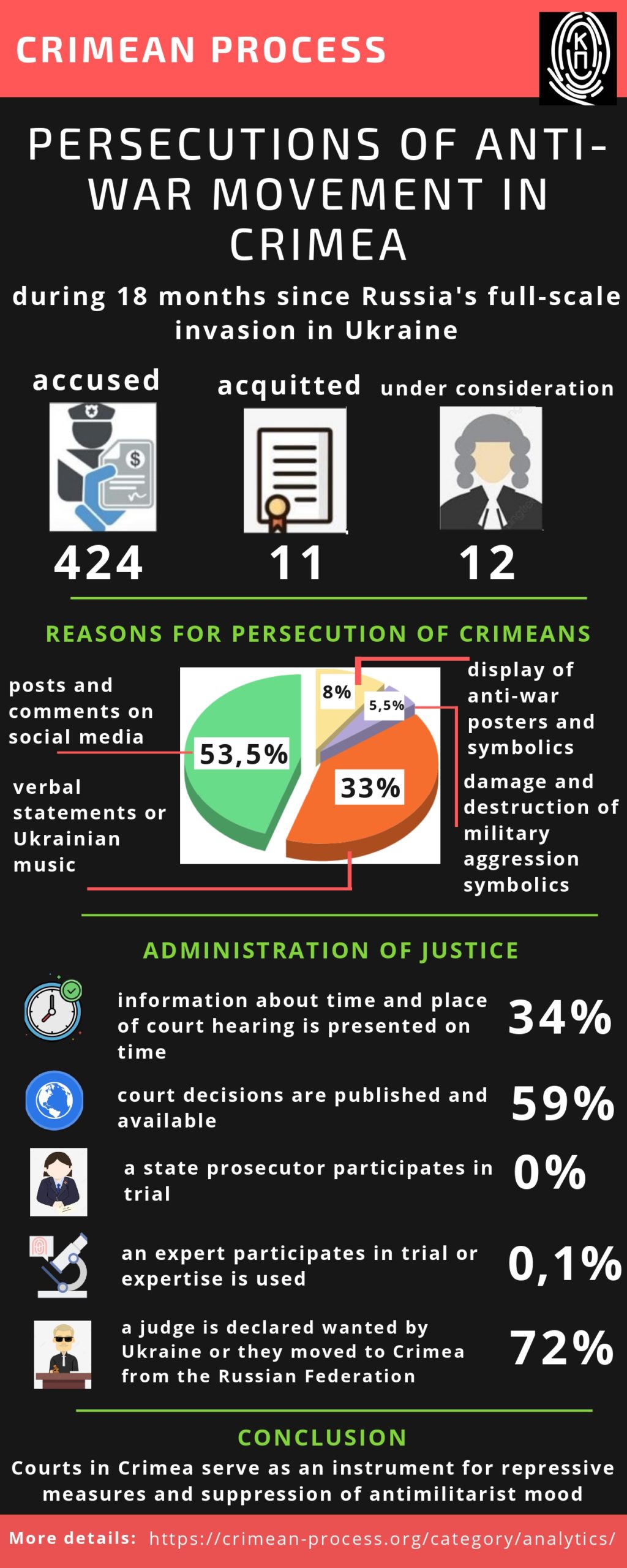
In the past three months, there have been cases of people being prosecuted for speaking out against the Russian army to “traffic police officers” or for using obscene or offensive language when speaking about Russian servicemen on duty.
The least common form of “discrediting” the Russian army is writing anti-war/pro-Ukrainian graffiti or vandalizing symbols used by the Russian military in the war. However, there have been at least three cases of people being prosecuted for this in the past three months.
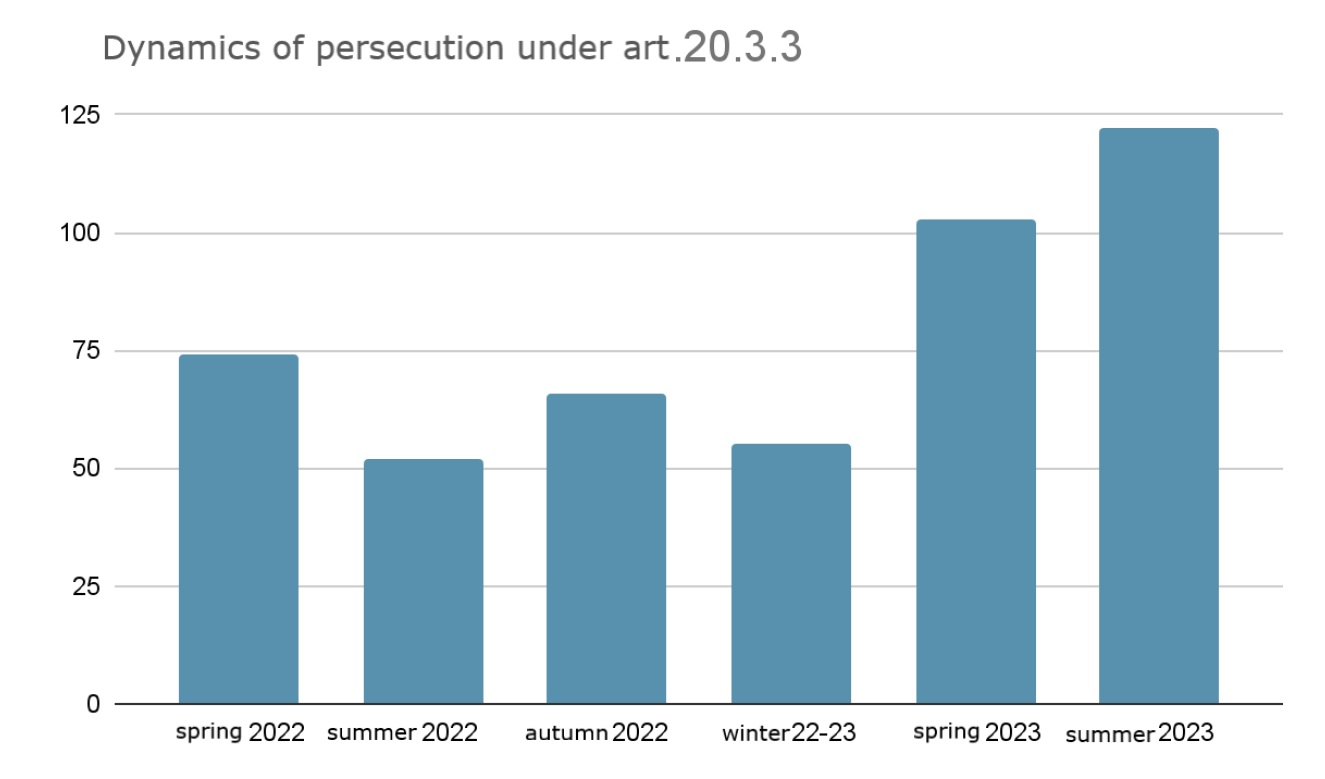
FSB SMERSH community
In order to persecute Crimeans for their anti-Russian, anti-Putin, or pro-Ukrainian views, as well as for criticizing Russian or local occupation authorities, pro-Russian blogger Aleksandr Talipov created the internet community “Crimean SMERSH”. The name originates from the word “SMERSH” used to name counter-intelligence agencies in the USSR during the Second World War, NKVD units. The word is an acronym for “Death to Spies”">і . SMERSH was a tool of repressions used by the USSR.
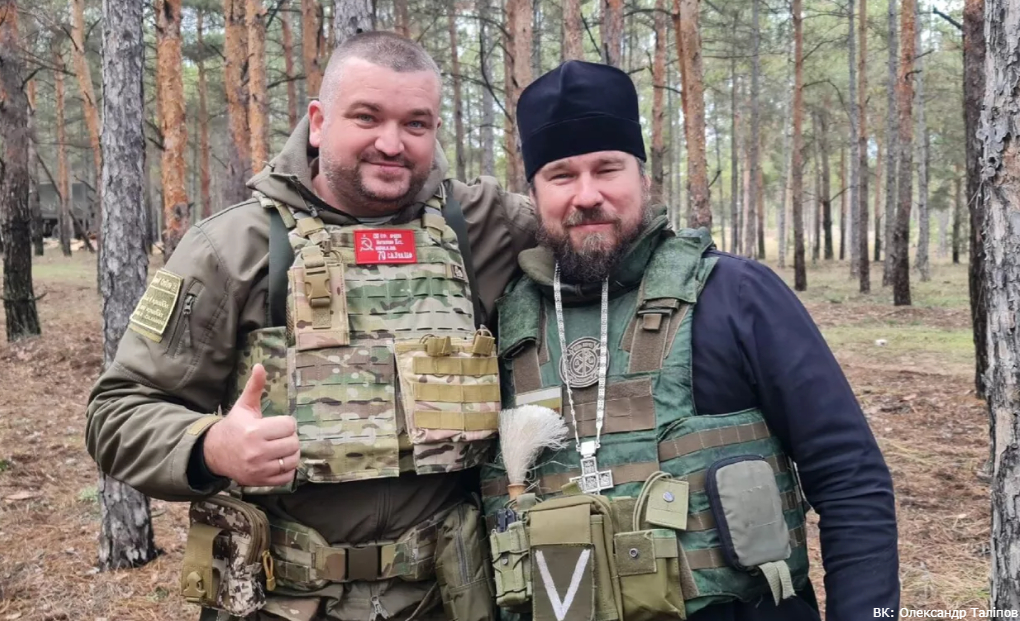 Oleksandr Talipov (on the left)
Oleksandr Talipov (on the left)According to the Crimean Human Rights Group, members of the newly established SMERSH community began persecuting individuals who did not support the occupying authorities and the war against Ukraine when the full-scale invasion started.
The community publicly shares personal information about these individuals, incites hatred against them, calls for their persecution, and files reports with the illegal FSB Administration of the Republic of Crimea and “Ministry of Internal Affairs” on the occupied peninsula.
The information from the SMERSH community has been used to open criminal and administrative cases against Crimeans on numerous occasions. The community’s founder and administrator Talipov uses hate speech against Ukrainians and opponents of the Russian government. He also collaborates with the FSB to persecute Crimeans.
- “The war with Ukraine is a terrible, absurd, and incompetent war, the most dishonorable, shameful, and unjust in Russian history.”
“Crimea is Ukraine.” - “I do not support the Special Military Operation conducted by the Russian Federation, and I am dissatisfied with the Russian government, including the President of the Russian Federation.”
- “Glory to Ukraine.”
- “No war. We stand with Ukraine.”
For instance, in June 2023, Yuriy Velychko and his son, Oleksandr, from Siverne, Chornomorskyy District, were detained. Aleksandr Talipov posted the information about them in SMERSH telegram community. They were forced to apologize on camera for “discrediting the Russian army, the president of the Russian Federation, and denying the territorial inclusion of Crimea in the Russian Federation on social networks,” according to the Crimean Human Rights Group. The “Razdol’noye District Court” imposed a fine of 2,000 rubles on each of them.
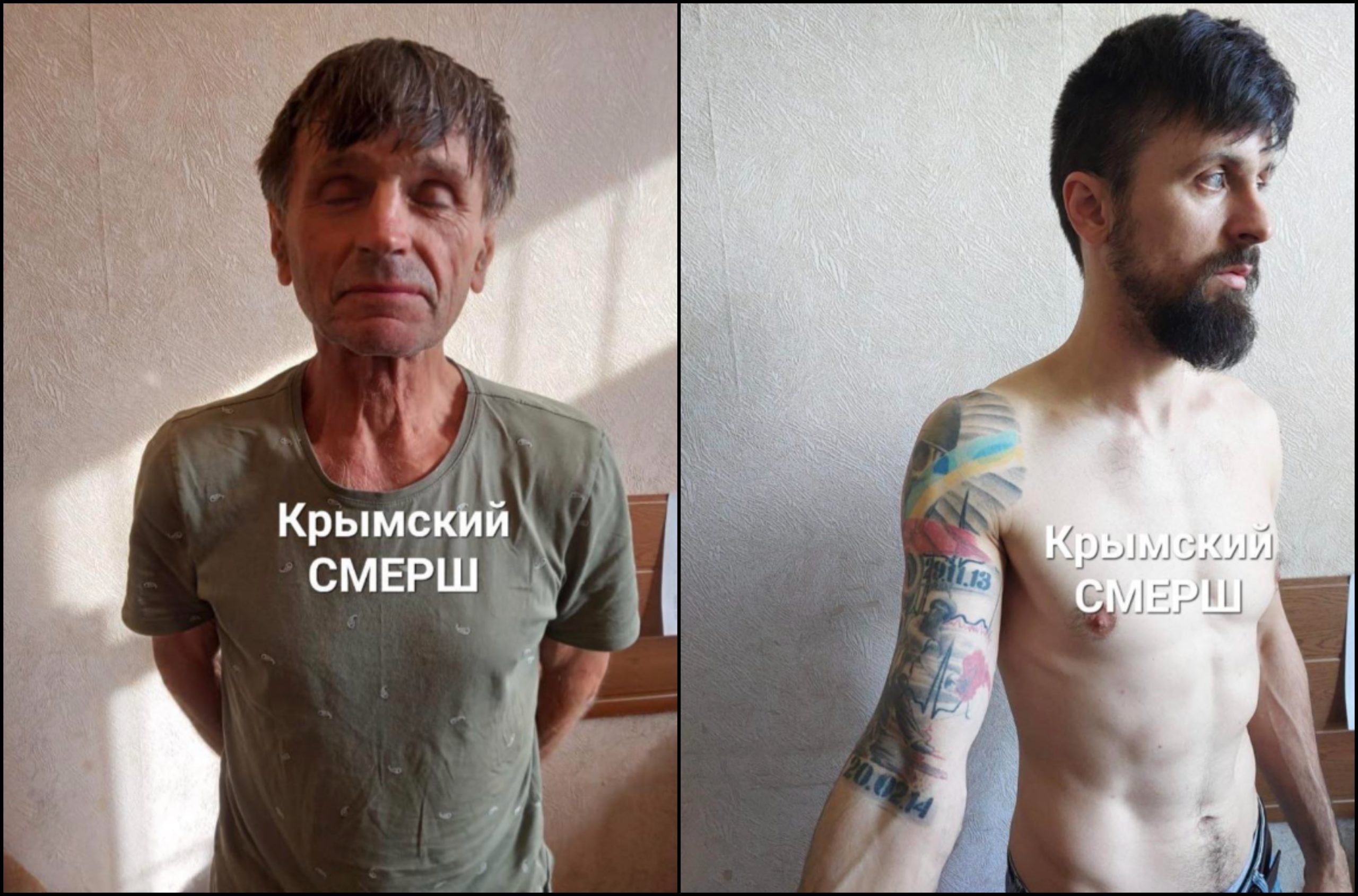 The Velychkos Family
The Velychkos FamilyAt the end of June 2023, Denys Bulygin, a Simferopol resident, was fined by the “Kievskiy District Court” for a 16-second video that “expresses support for Ukraine, shows gestures of congratulation of the Armed Forces of Ukraine.” The “court” imposed a fine of 50,000 rubles for violation of RF CoAO Article 20.3.3-1 (“public actions aimed at discrediting the use of the Armed Forces of the Russian Federation”).
In early June, two local residents, Yehor Savchenko and Mykhailo Zhydkov, were detained in Kerch. They were detained for posting anti-war graffiti in the city. According to the occupation authorities, a criminal case was commenced against them under RF CC Article 214-2 (“vandalism motivated by political hatred”). Yehor Savchenko is known to have been placed on house arrest by the “Kerch City Court”.
Occupying “judges” biased against defendants in war-related cases
Crimean Process notes that it is entirely logical for individuals who denounce the full-scale war against Ukraine to express clear sympathy towards Ukraine, given that Article 20.3.3 of the Code of Administrative Offense was introduced after the war began.
Crimean Process has reported that it is essential to determine whether “judges” on the peninsula who preside over cases under this Article be formerly Ukrainian judges. The organization states that their involvement in criminal cases in Ukraine may influence their biased attitudes towards the conflict, the state, and individuals supporting Ukraine.

